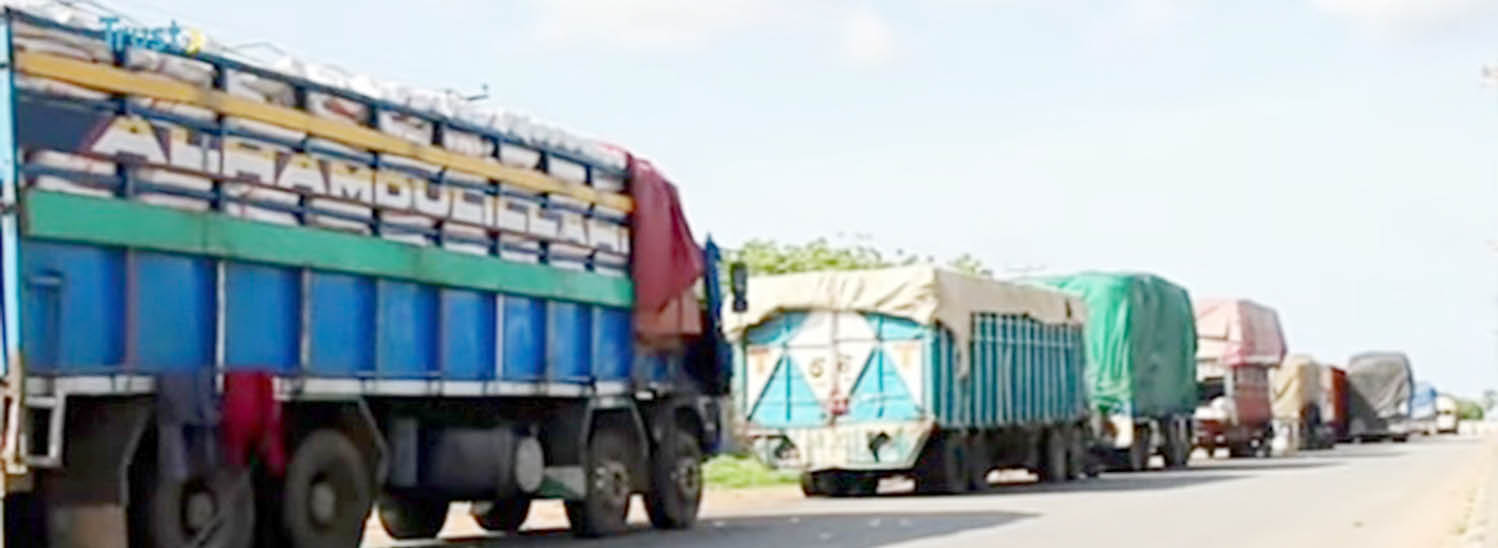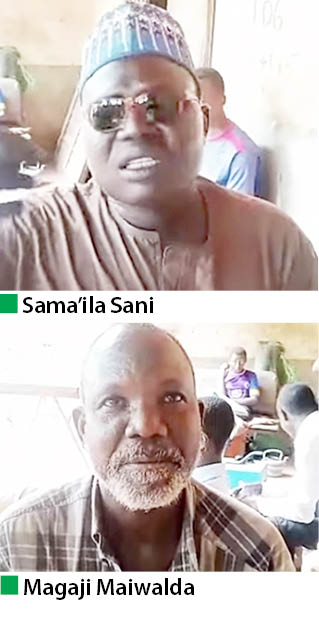Border closure: We’re suffering – Nigeriens
It was a tortuous journey with lots of experiences. The journey wouldn’t have been possible without the support of Attahiru Illela, a commercial motorcyclist who has mastered the terrain and knows how to get past the multiple checkpoints along the bush paths. The journey started around 2 p.m. after a painstaking negotiation on what to […]

Trucks at Nigeria, Niger border
It was a tortuous journey with lots of experiences. The journey wouldn’t have been possible without the support of Attahiru Illela, a commercial motorcyclist who has mastered the terrain and knows how to get past the multiple checkpoints along the bush paths.
The journey started around 2 p.m. after a painstaking negotiation on what to charge as transport fare. According to Malam Attahiru Illela, they were charging high because they paid not less than N500 at every security checkpoint.
After inquiring from his colleagues which route was the safest and with fewer security checkpoints, he decided to take a bushy path, which was very rough and muddy, in addition to security concerns because it was just a classical example of what the Hausa people call “ehunka banza,” meaning no matter how loud you shout, nobody will ever hear you.
My trouble started when we reached a nomadic community which he told me harboured the people terrorising their communities at night. I became terrified and resorted to fervent prayers for our safety.
Nigeria Loses N8.7trn For Failing To Meet OPEC Quota In 8 Months
I have no money, but I am very happy – Prof. A.T. Abdullahi (former Deputy Gov, Kano State)
After spending almost an hour struggling, we finally arrived at Konni, a local government area in Tahoua State of Niger Republic. Our first place of call was a shop belonging to a local shoe seller, where we had a little interaction as I wanted to study the intensity of the situation in the area before knowing my next line of action.
I told him I was a shoe dealer in Illela Local Government Area thinking of expanding my business to Konni and that was why I came to look for prospective buyers. This made him relax and told me everything about shoe business in the area, including where they were getting their products and how the people of Nigeria were of use to their communities.
After minutes of discussion, we exchanged contacts and he promised to visit my shop anytime he came to Illela. And the promise was kept, as a few weeks after our meeting I received his call, informing me that he was at Illela town. He asked where he would meet me but I told him I was away for a business trip.
After leaving his shop we rode deep into the town, including their market and motor park, but Malam Attahiru Illela warned me against doing anything that could attract the attention of the local authorities to us. This was why I could not take better pictures of the trip.
At the market site, we met the chairman of the Commercial Motorcycles Association of Konni, Malam Sanusi Ahmadu, who was a friend of Malam Attahiru at their park. Attahiru excused him and they entered into a nearby makeshift tent, where he introduced me. He agreed to grant me an interview and even convince other locals to do so, saying only God could separate the citizens of the two countries.
The interview was arranged outside a shop of a welder, which was some meters away from the main road, and according to them, the safest for the interview.
I first interviewed Malam Sanusi, after which he convinced the chairman of the Bureau de Change Operators in Konni, Alhaji Sama’ila Sani, who also spoke on the impact of the sanctions imposed on their country by the Economic Community of West African States (ECOWAS) on their businesses.
They invited the welder and a transport worker who also spoke on the subject matter.
Only God can separate the people of the two countries – Ahmadu
The chairman of the Commercial Motorcycles Association in Konni, Sanusi Ahmadu, believes that there would be light at the end of the tunnel.
He said only God could separate them from the people of Nigeria because there was a strong bond between them.
“No amount of military operatives at the border will prevent the people of the two countries from visiting one another because of our strong bond. Apart from being neighbours, we have marital relationships.
“We have sisters who are in Nigeria and there are Nigerians who are married here. The two countries depend on each other for food and other things.
“Additionally, our borders with Nigeria are porous. There are over 100 ways through which one can enter into Nigeria without being traced. I personally ride into the country, at least five times a day. We are just like brothers from the same parents. Only God can separate us,” he said.
Things are no longer the same – Sani
Alhaji Sama’ila Sani, the chairman of Bureau de Change Operators in Konni lamented that things were no longer the same for their people since the border was closed.
He said, “Prices of commodities have skyrocketed. Transport fares are high. Prices of food have gone up, just like the price of fuel.
“Things we were buying very cheap before are now beyond our purchasing power.
“Our people that used to travel all the way to Lagos in Nigeria for greener pastures have stopped because they cannot afford the cost of transportation. And they are the reason we are here because we change currency for them.
“I pray and hope for the peaceful resolution of the matter because our people are suffering.
“A bag of rice we used to buy at N11,000 is now N19,000.
“We are appealing to President Bola Tinubu to ensure that the matter is resolved amicably because any military confrontation would only add to our suffering.”
We can no longer feed our families – Magaji Maiwalda
Another resident of Konni, Magaji Maiwalda noted, “We have been out of business since the Nigerian government decided to cut off our light last week as part of measures against our new leaders.
“Before now, we were getting 24-hour electricity; and if there was any problem that would lead to power outage, we would be given prior notice. But we have been in darkness since the sanction was imposed, and this has been negatively affecting our businesses, and by implication, our families because this is our only source of livelihood.
“We are calling on our leaders to look into our plight and resolve the problem. We don’t want war,” he said.
We’re out of business – Road transport workers
Transport workers in Niger Republic also lamented the multiple sanctions imposed on their country by ECOWAS over the current political crisis in the country. They specifically lamented the closure of the Nigerian border, which they said had rendered them idle and without income.
Tens of commercial vehicles with hundreds of passengers and their goods crossed the Nigeria-Niger border through the Illela axis every day until it was shut down recently, according to findings by Daily Trust on Sunday.
Our correspondent who visited the terminus for any commercial vehicle that comes from Illela in Sokoto State of Nigeria to Konni saw only one vehicle, which was said to have plied a secret route.
Daily Trust on Sunday could not ascertain the legality of the park, but according to locals, it is one of the major parks in Konni Local Government of Tahoua State of Niger Republic.
They said the park used to receive tens of commercial vehicles daily, either taking off or coming from Nigeria.
Many locals depended on this park to cater for their families, either as loaders, hawkers or petty traders, but the sanctions imposed on their country by the Nigerian government, particularly the border closure have forced many of them out of job.
Our correspondent wanted to take a closer shot of the vehicle and even interview the driver but was advised against such action.
Rabi’u Musa, a transport worker who is fondly called OC by his colleagues, described their plight as pathetic and appealed for a quick and peaceful resolution of the impasse so that they could all go back to their job.
“The closure of our border by the Nigerian government is hitting hard on us. We are just struggling to survive.
“Before now, over 20 vehicles took off from here to Nigeria every day. We hardly dispatch five now because of the border closure.
“This is seriously affecting us because this is where we eat, drink and even provide for our families. We want this problem resolved in earnest. We can’t continue this way,” he lamented.
I had wanted to spend the night in Konni but my interviewees doubted if it was a right decision because security operatives could get wind of that and possibly arrest me, so I decided to come back to Illela; and Malam Attahiru, as wise as he was, took a different route back to Illela.
The first community to meet after leaving Konni through our new route was Araba, which is one of the districts of Ilela Local Government Area.
I made efforts to interview the district head of the community but he declined to talk on the matter. He referred me to the village head of the area, Malam Ibrahim Yan Matan Araba, who obliged my request.
During the interview, he cautioned the Nigerian government against leading other countries for possible military intervention in Niger Republic.
He insisted that military action could not be a solution to the problem.
“We commended our lawmakers for rejecting the request of President Bola Tinubu for military intervention in Niger Republic because we have our people who are doing businesses in the country.
“Nigerien nationals could vent their anger on them, even though we have been warning them to steer clear of their local affairs,” he said.
